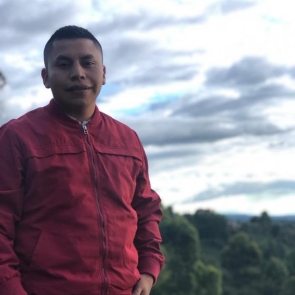Attack against indigenous leader Yesid Conda Pacho
On 19 January 2020, a group of heavily armed men arrived at the residence of indigenous rights defender Yesid Conda Pacho, in the center of the Pitayó indigenous reservation (resguardo), municipality of Silvia, Cauca. During the incident, the human rights defender and the bodyguards assigned to him by the National Protection Unit were threatened at gunpoint.
 Yesid Conda Pacho is a Nasa human rights defender and community leader in the northeast of Cauca. He served as Traditional Authority of the Indigenous Reservation of Pitayó on two occasions, in 2017 and 2019. Due to his community work as a leader of Nasa people in the northeast of Cauca, he has been the subject of multiple death threats by armed groups. As a result, the community was granted protection measures by the government, including a protection scheme assigned by the National Protection Unit (UNP).
Yesid Conda Pacho is a Nasa human rights defender and community leader in the northeast of Cauca. He served as Traditional Authority of the Indigenous Reservation of Pitayó on two occasions, in 2017 and 2019. Due to his community work as a leader of Nasa people in the northeast of Cauca, he has been the subject of multiple death threats by armed groups. As a result, the community was granted protection measures by the government, including a protection scheme assigned by the National Protection Unit (UNP).
On 19 January 2020, a group of heavily armed men arrived at the residence of indigenous rights defender Yesid Conda Pacho, in the center of the Pitayó indigenous reservation (resguardo), municipality of Silvia, Cauca. During the incident, the human rights defender and the bodyguards assigned to him by the National Protection Unit were threatened at gunpoint.
Yesid Conda Pacho is a Nasa human rights defender and community leader in the northeast of Cauca. He served as Traditional Authority of the Indigenous Reservation of Pitayó on two occasions, in 2017 and 2019. Due to his community work as a leader of Nasa people in the northeast of Cauca, he has been the subject of multiple death threats by armed groups. As a result, the community was granted protection measures by the government, including a protection scheme assigned by the National Protection Unit (UNP).
On 19 January 2020, at approximately 9:50am, a black truck with around 10 heavily armed men wearing national army and national police uniforms, and carrying long-range armament, arrived at the house of Yesid Conda Pacho, in the Ancestral Territory of the Nasa People of Pitayo. According to the reports received, upon arrival, the group proceeded to violently intimidate the bodyguards . They also pointed their guns at the human rights defender and ordered him to enter the black truck. The armed men refused to identify themselves or to provide the reasons for the violent attack.
Thanks to the rapid reaction of the community and the authority of the indigenous council, what the community has characterised as a “kidnapping plan” failed. The armed group fled after being cornered by the community. When driving away at high speed, their truck almost run over the human rights defender and other community members, who tried to prevent the escape of the attackers. Community members installed several checkpoints on the road, which the truck avoided until it stoppedat the Jambalo Police Station. According to the information gathered by the community, the truck left that same police station before heading directly to the house of Yesid Conda Pacho. After the attack, the community also made public that the current Traditional Authority (the position held previously by Yesid Conda Pacho) has also been subjected to intimidation and threats by alleged members of the illegal armed group Dagoberto Ramos.
Front Line Defenders condemns the attack against Yesid Conda Pacho and expresses its deep concern at the continuous and increasing violence against human rights defenders in Colombia, where year after year more social leaders are killed than in any other country worldwide. The department of Cauca has been ranked as one of the most violent departments for human rights defenders in Colombia, while the work of defenders and indigenous authorities has been essential to address and minimise the impacts of the violence perpetrated in rural areas on the local population.
Front Line Defenders is also outraged at the defensive response of the government to data provided by civil society on killings of social leaders, and its failure to address the root causes of the issue and officially recognise the systematic character of these crimes, which are often carried out with the participation of, or tolerance by, state agents, reinforcing the country’s high levels of impunity regarding crimes committed against human rights defenders.
